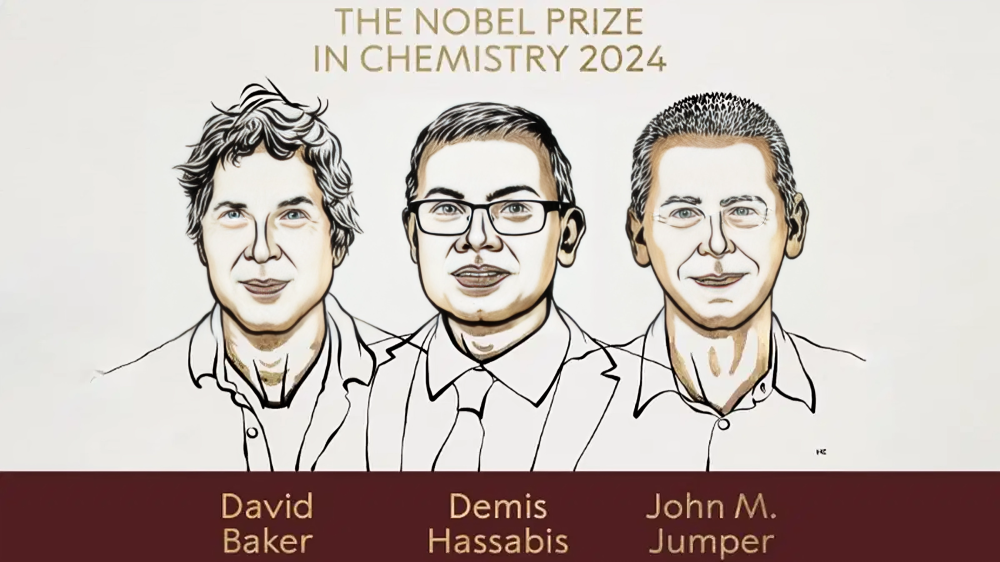The 2024 Nobel Prize in Chemistry has been awarded to David Baker for “computational protein design” and jointly to Demis Hassabis and John M. Jumper for “protein structure prediction.”
The 2024 Nobel Prize in Chemistry has been awarded for significant advancements in understanding proteins, which are essential to life. David Baker is recognized for his remarkable achievement in computational protein design, successfully creating entirely new types of proteins that can be utilized in pharmaceuticals, vaccines, and nanomaterials. His work has demonstrated the potential to design proteins with specific functions, contributing to various scientific and medical applications.
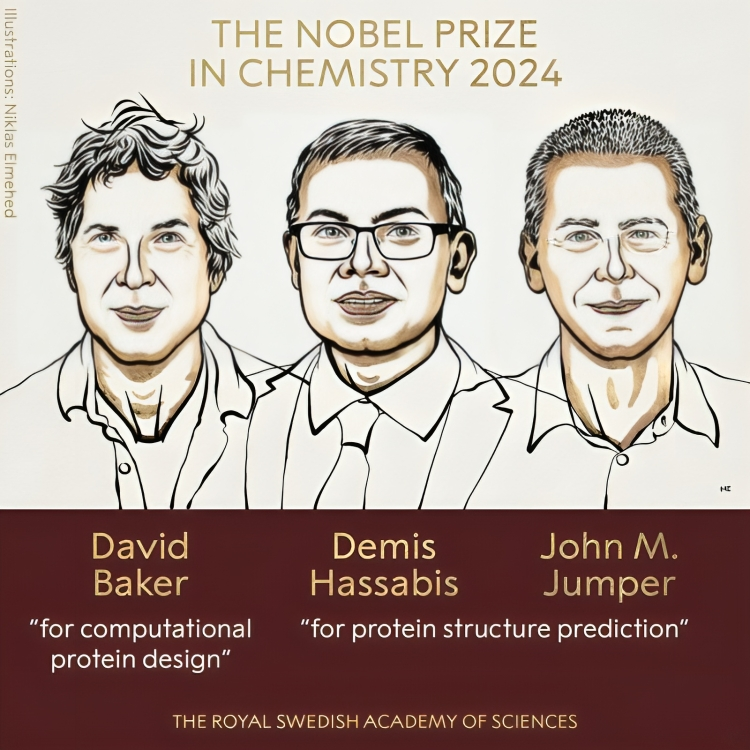
Demis Hassabis and John M. Jumper jointly received the prize for their development of AlphaFold2, an AI model that addresses a longstanding challenge in biology: predicting the complex three-dimensional structures of proteins from their amino acid sequences. This breakthrough allows researchers to accurately predict the structures of nearly all known proteins, facilitating advancements in understanding biological processes and addressing issues like antibiotic resistance.
Heiner Linke, Chair of the Nobel Committee for Chemistry, emphasized that these discoveries open vast possibilities for science and medicine. The ability to construct novel proteins and predict their structures from sequences enhances our understanding of life’s fundamental processes and holds enormous potential for future innovations.
About Nobel Prize in Chemistry
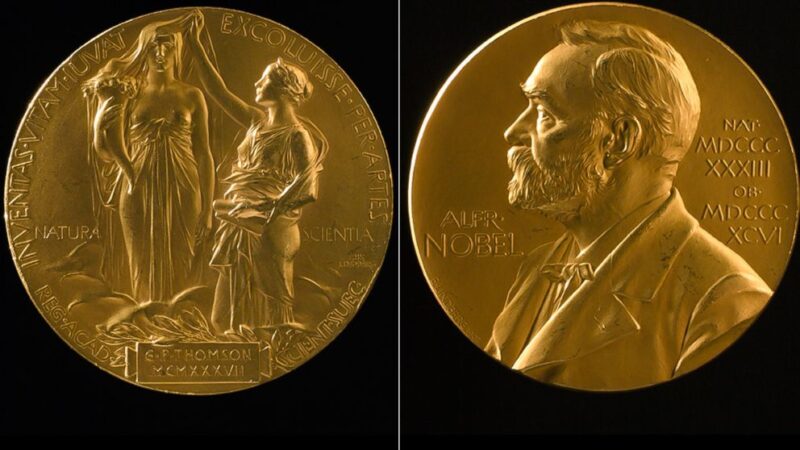
The Nobel Prize in Chemistry is awarded annually by the Royal Swedish Academy of Sciences to recognize outstanding contributions in the field of chemistry. Established by the will of Alfred Nobel in 1895, it is one of the five Nobel Prizes that include those for physics, literature, peace, and physiology or medicine. The first Nobel Prize in Chemistry was awarded in 1901 to Jacobus Henricus van ‘t Hoff for his work on chemical dynamics and osmotic pressure.
The prize aims to honor individuals who have made significant advancements in chemistry, which can include areas such as organic chemistry, biochemistry, and materials science. Recipients receive a medal, a diploma, and a monetary award that varies each year. The award ceremony takes place in Stockholm on December 10, the anniversary of Nobel’s death.
Throughout its history, the Nobel Prize in Chemistry has recognized a wide range of scientific achievements and has been awarded to many notable chemists. Some laureates have received the prize multiple times, highlighting their substantial contributions to the field. The prize has also faced criticism for occasionally recognizing work that straddles the boundaries of chemistry with other disciplines like biology and physics.
David Baker
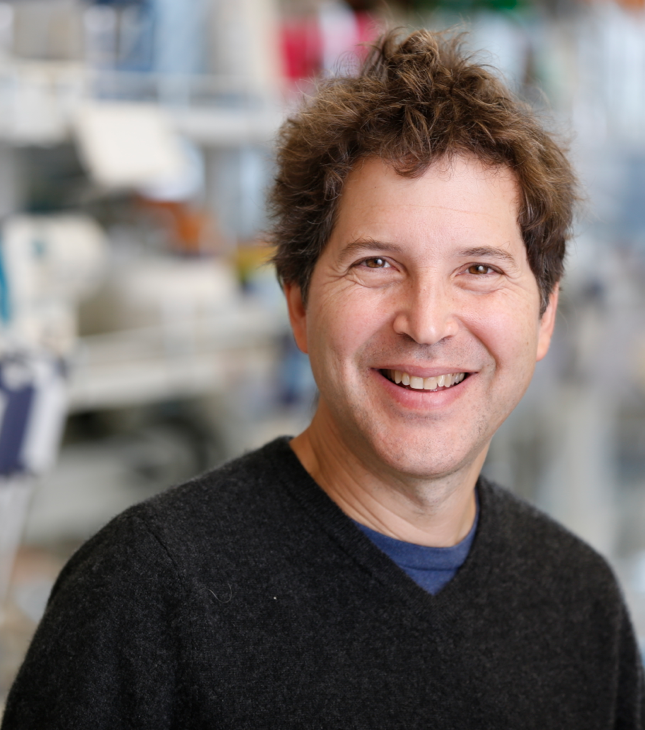
David Baker was born in October 6, 1962.He is an American biochemist and computational biologist known for his groundbreaking work in protein design and structure prediction. He serves as the Henrietta and Aubrey Davis Endowed Professor in Biochemistry at the University of Washington, where he is also an investigator with the Howard Hughes Medical Institute and an adjunct professor in multiple disciplines.
Baker’s research combines computational methods with experimental techniques to create custom proteins, significantly advancing the field of synthetic biology. He developed the Rosetta software, which has become a crucial tool for protein structure prediction and design. His lab achieved a milestone by creating Top7, the first artificial protein with a novel fold.
Born into a Jewish family in Seattle, Baker graduated from Harvard University and earned his doctorate at UC Berkeley. He joined the University of Washington in 1993 and has since published over 600 scientific papers and co-founded numerous biotechnology companies. His work has transformed protein research, particularly through the integration of artificial intelligence to enhance structure prediction accuracy.
Baker’s achievements have earned him numerous awards, including the Overton Prize and the Breakthrough Prize in Life Sciences. His dedication to open science fosters collaboration among researchers globally, ensuring that advancements in protein design are widely accessible.
“Now with the ability to design new proteins, specifically to solve problems there’s just so many possibilities. It’s really exciting.”
Demis Hassabis

Demis Hassabis, born on July 27, 1976, is a British computer scientist, artificial intelligence researcher, and entrepreneur. He is the co-founder and CEO of DeepMind, a leading AI research company known for its groundbreaking work in machine learning and neural networks. Hassabis gained recognition for his contributions to the development of AlphaFold, an AI system that predicts protein structures, which earned him a share of the 2024 Nobel Prize in Chemistry alongside David Baker and John Jumper.
Hassabis has a background in video game design and programming, having created notable games like Theme Park. He studied computer science at Cambridge University and later earned a PhD in cognitive neuroscience. His early research linked memory processes to imagination, establishing foundational concepts in understanding human cognition.
As a chess prodigy, he achieved Master status at age 13 and has since excelled in various board games. Under his leadership, DeepMind has made significant strides in AI, including mastering complex games like Go and StarCraft II. Hassabis is also recognized for his advocacy on the responsible development of AI technologies, emphasizing the need to address potential risks associated with advanced AI systems.
In addition to his scientific achievements, he has received numerous awards and honors, including being knighted for his contributions to the field of AI. His work continues to influence both the scientific community and the tech industry significantly.
“I feel like you can do great science anywhere as long as you’re approaching it in the right way with, and doing fundamental research.”
John M. Jumper
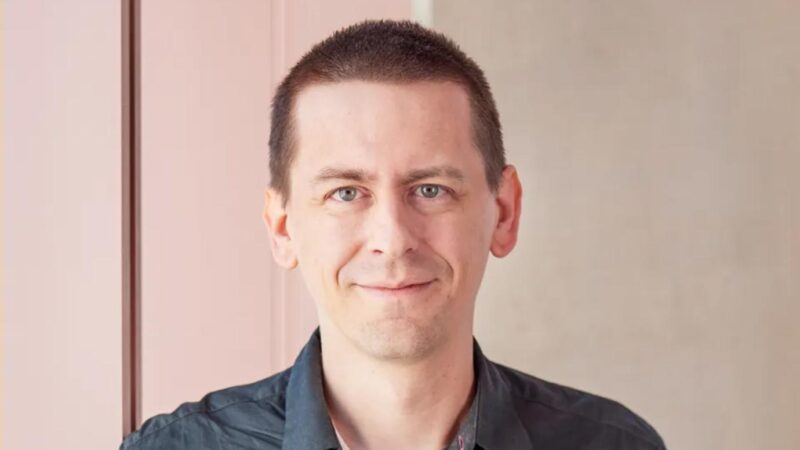
John M. Jumper, born in 1985, is an American chemist and computer scientist known for his groundbreaking work in protein structure prediction. He is a senior research scientist at DeepMind, where he co-developed AlphaFold, an AI model that accurately predicts the three-dimensional structures of proteins from their amino acid sequences.
Jumper earned his Bachelor of Science degree in physics and mathematics from Vanderbilt University in 2007, followed by a Master of Philosophy in theoretical condensed matter physics from the University of Cambridge in 2010. He completed his PhD in theoretical chemistry at the University of Chicago in 2017.
His research has significantly advanced the understanding of protein folding, a challenge that has puzzled scientists for decades. AlphaFold’s predictions have been made freely available and have been utilized by over two million researchers worldwide, facilitating advancements in various scientific fields, including drug discovery and enzyme design.
Jumper’s achievements have garnered numerous accolades, including the BBVA Foundation Frontiers of Knowledge Award and the Breakthrough Prize in Life Sciences. His work exemplifies the transformative potential of artificial intelligence in scientific research, particularly in biology and medicine.
“What I love about all this is that, we could draw a straight line from what we do to people being healthy because of what we learn about biology in the cell and everything else. And it’s just extraordinary.”
“BREAKING NEWS
The Royal Swedish Academy of Sciences has decided to award the 2024 Nobel Prize in Chemistry with one half to David Baker “for computational protein design” and the other half jointly to Demis Hassabis and John M. Jumper “for protein structure prediction.”
The Nobel Prize in Chemistry 2024 is about proteins, life’s ingenious chemical tools. David Baker has succeeded with the almost impossible feat of building entirely new kinds of proteins. Demis Hassabis and John Jumper have developed an AI model to solve a 50-year-old problem: predicting proteins’ complex structures. These discoveries hold enormous potential.
The diversity of life testifies to proteins’ amazing capacity as chemical tools. They control and drive all the chemical reactions that together are the basis of life. Proteins also function as hormones, signal substances, antibodies and the building blocks of different tissues.
Proteins generally consist of 20 different amino acids, which can be described as life’s building blocks. In 2003, David Baker succeeded in using these blocks to design a new protein that was unlike any other protein. Since then, his research group has produced one imaginative protein creation after another, including proteins that can be used as pharmaceuticals, vaccines, nanomaterials and tiny sensors.
The second discovery concerns the prediction of protein structures. In proteins, amino acids are linked together in long strings that fold up to make a three-dimensional structure, which is decisive for the protein’s function. Since the 1970s, researchers had tried to predict protein structures from amino acid sequences, but this was notoriously difficult. However, four years ago, there was a stunning breakthrough.
In 2020, Demis Hassabis and John Jumper presented an AI model called AlphaFold2. With its help, they have been able to predict the structure of virtually all the 200 million proteins that researchers have identified. Since their breakthrough, AlphaFold2 has been used by more than two million people from 190 countries. Among a myriad of scientific applications, researchers can now better understand antibiotic resistance and create images of enzymes that can decompose plastic.
Life could not exist without proteins. That we can now predict protein structures and design our own proteins confers the greatest benefit to humankind.
Learn more:
Press release.
Popular information.
Advanced information.”


